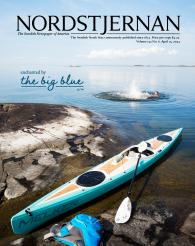A group of Women sue Lund University. Swedish born Jonas Andersson makes Thailand dance. Most popular food in Sweden. “Who am I?”
Women sue Lund University.
A group of women who are suing a Swedish university for gender discrimination have also reported Sweden’s Equality Ombudsman (Diskrimineringsombudsmannen – DO) to the Ombudsmen of Justice – JO), charging the agency failed to take up their case. The women claim they were denied admission into the psychology program at Lund University in southern Sweden on account of their gender. They argue that they were passed over in favor of men, who received priority treatment for admission in order to increase the number of men in the program. In addition to filing a lawsuit alleging illegal discrimination against the university, the 31 women have also reported the Equality Ombudsman for failing to carry out its responsibilities as the arbiter of discrimination claims in Sweden. According to lawyers Gunnar Strömmer and Clarence Crafoord with the Stockholm-based Centre for Justice (Centrum för rättvisa), which has agreed to assist the women in the Lund case, the ombudsman refused the case because of a similar, ongoing case involving the Swedish University of Agricultural Sciences (Sveriges lantbruksuniversitet – SLU). SLU was found guilty of discrimination by the district court in Uppsala for having given preferential treatment to men seeking admission to the school’s veterinary program.
Jonas makes Thailand dance.
Meet Jonas Anderson, born in Sweden but with a fan base in Thailand. All over markets in Thailand, among domestic stars and pirate copies of close to everything, you can be sure to find an album or two with Jonas Anderson, the blond Swede with the friendly smile. He doesn’t sing regular pop or rock, he sings the folksy music lookthung. “Lookthung is very popular, it has roots in traditional music and it is the most typical Thai pop music there is,” says Jonas Anderson, star of lookthung (which by the way means “child from the field”). Anderson was born in Sweden and his name then was Jonas Wadenholm, but when he was 9 he moved with his family to Thailand. When his parents left Thailand ten years later, Jonas decided to stay. He speaks Thai fluently and hasn’t forgotten his Swedish (although it’s now mixed with English). “Nobody could pronounce Wadenholm, so I decided to change it to Anderson, which is my artist name,” he says. As a typical lookthung star, Jonas performs in colorful clothes with a lot of glitter, no jeans or plaid shirts will do. He is used to giving concerts abroad, but now he is coming home to Sweden to perform for the first time (at Stockholm’s Södra teatern and in Sundsvall’s teater) and will bring a little orchestra and four dancers with him. He has two major groups of supporters in Sweden: The Thai colony, and Swedes with a penchant for all things Thai. “I’ve really worked hard at being accepted in Thailand,” Jonas says. “But as a foreigner I cannot hide the fact that I am white and blond. In my heart, though, I would like it if we could all see each other as one and the same. I don’t want Swedes to view me as Thai or Thai to think of me as a Swede. I want to be able to move freely in between.”
For more info, see
www.jonas-christy.com (Rest assured there is an English version..)
Most popular food.
What food do Swedes eat most of? Well, this year (2009) is no different than any other. Number one on the most popular food list remains falukorv (a large traditional Swedish sausage made of a grated mixture of pork and beef or veal with potato flour and mild spices. The word’s literal meaning is “sausage from Falun”). The rest of the list looks like this: 2. Meat sauce (köttfärssås) 3. Pizza 4. Fish sticks 5. Ready-to-fry steak 6. Frozen meals 7. Ready made meatballs 8. Quick soups 9. Chicken dishes.
“Who am I?”
No, it’s not a children’s game, it’s a plea from a mystery foreigner. The man who woke up in a Malmö hospital bed had no recollection of who he was or how he got there. Now he has turned to the Swedish public for help in finding his identity. “Please,” he said in a televised interview, “has anyone seen me before?” He refers to himself as Sami Hussein and is currently staying in a hotel located in Arlöv, outside of Malmö, a hotel often used by the Swedish Migration Board (Migrationsverket). He speaks English well, but doesn’t know how or why he came to Sweden. “I don’t remember anything about my family, but there must be sibling, cousins, and all the rest, right? I can’t be alone in the world.” Hussein was found four weeks ago outside the Malmö police station, at which point he was taken to hospital for treatment of a mild stroke. His first memory is waking up in the hospital bed. He thinks he was born on March 3rd, 1949, but there is no record of anyone matching his description in either the police’s or Migration Board’s databases. While the last several weeks have been difficult for him, he is generally pleased with his time in Sweden so far – at least what he remembers of it. “Everyone here in Sweden has been great! So helpful and friendly. And it’s a very clean country.”





